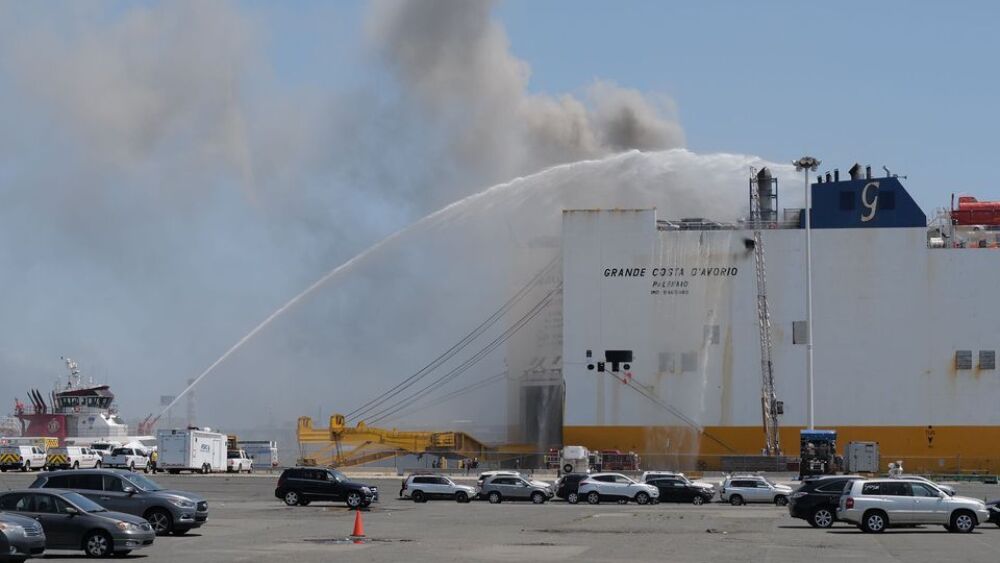By Jackie Roman, Ted Sherman
nj.com
NEWARK, N.J. — It was like trying to put out a house fire with a garden hose.
According to city officials, a fire brigade from Port Authority of New York and New Jersey was already at Port Newark trying to extinguish a huge blaze on the Grande Costa d’Avori when Newark firefighters arrived at the scene late Wednesday night, they said at a press conference on Thursday.
“Obviously this became an issue where they (the Port Authority) just didn’t have the capacity at all to deal with what was going on, so we had to take full control,” said Newark Fire Chief Rufus Jackson.
The Port Authority said Thursday evening, however, there was no agency fire brigade. Officials there said that at all non-airport facilities, firefighting is handled by the local municipality with jurisdictional responsibility.”
“The Port Authority provides support and assistance in these efforts including regular classroom and on-site shipboard orientation training to fire department personnel and first responders,” said a spokeswoman.
City officials Thursday night not immediately be reached for clarification.
What was clear is that for some reason, the hoses available on the scene were not nearly large enough to handle the volume of water needed to knock down the flames, according to Anthony Tarantino, president of the Newark Fire Officers Union, who said the issue was getting enough water on the fire.
The hoses were only 1-inch diameter, more suitable for putting out dumpster fires in the industrial port. This fire, Tarantino explained, needed more penetration and pressure that called for much larger 2 ½ inch hose that would have been able to blast the fire from a greater distance.
“The Newark Fire Department is one of the best fire departments in the country,” he said. “We are capable of handling any fire, but the combination of fighting a fire in the equivalent of a 12-story building on a ship with 1-inch diameter hose, which does not provide the protection, reach, and ability to put out the volume of fire, caused the deaths of our brave brothers,” he said.
[EARLIER: Ship fire that killed N.J. FFs continues to burn]
Grimaldi Deep Sea, the operator of the ship, said the fire first broke out at approximately 9:30 pm Wednesday evening on Deck 10 while crew and stevedores on the Italian-flagged vessel that was built in 2011 were completing the loading of various cars, vans, trucks.
The Grande Costa d’Avori, in-bound from Baltimore, was carrying over 1.200 new and secondhand cars, vans and other rolling equipment, as well as 157 cargo containers, the company said.
“The crew of the vessel immediately activated the on-board fire suppression procedures while the local firefighting service were alerted, and their prompt response played a crucial role in containing and bringing the fire under control,” Grimaldi said in a statement.
Two firefighters, however, lost their lives.
Augusto Acabou, 45, and Wayne Brooks Jr., 49, both long-time Newark first responders, died after they were trapped by the blaze.
Mayor Ras Baraka at a press conference Thursday morning described them as heroes.
“All night and this morning, I keep having images of two firefighters being lowered down from a pulley from a ship that had to be at least 150 feet or so high, and firefighters lined up on both sides as their fallen brothers were taken to the hospital. That image will forever be stamped in my mind. How dangerous this job is and how precarious things can be for our men and women in the fire service as they do their best to save people’s lives and property,” Baraka said. “Two of our bravest here in the city of Newark who, without hesitation, gave their lives.”
It was not known how the fire started, but the company said it will “undertake a full investigation in close cooperation with all relevant authorities.”
Jackson, meanwhile, called the circumstances of the fire “unique,” and could not recall how long ago the department trained on shipboard firefighting. But even that training, he said, involved firefighting aboard a vessel with living quarters and various compartments. This was a cargo ship.
The fire chief also suggested a lack of experienced firefighters may have contributed.
”Like every department across the country, there’s a big turnover of firefighters where you have a large number of members retiring all at once and then you get an influx of new firefighters. And a department this size, training just doesn’t happen overnight,” he said. “It’s a long process. It’s an on-the-job learning environment that we build on.”
According to the state Department of Community Affairs, its Division of Fire Safety investigates all firefighter fatalities and major firefighter injuries.
“As such, the division will conduct an investigation on this fatal fire,” a spokeswoman said, noting that marine and shipboard firefighting “is an extremely specialized craft,” which generally falls under the purview of the U.S. Coast Guard.
[RELATED: Cargo ship on fire and adrift at sea: What firefighters can learn from the response efforts]
©2023 Advance Local Media LLC.
Visit nj.com.
Distributed by Tribune Content Agency, LLC.












